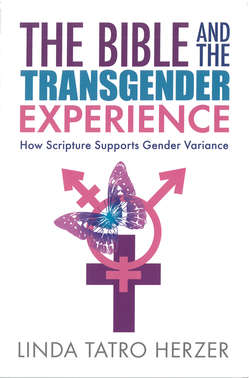Читать книгу Bible and the Transgender Experience - Linda Herzer - Страница 14
На сайте Литреса книга снята с продажи.
Оглавление5
DEUTERONOMY 22:5
Cross-Dressing to Express One’s Truth or to Do Harm?
When I was a student at Asbury Theological Seminary, my professors taught us that a responsible interpretation of scripture required several things. First, it was important to know the actual meanings of the words we were reading, to understand what they meant in their original Greek (New Testament) or Hebrew (Old Testament). We were also taught that the best way to know the meaning of a specific word was to compare it to other places in scripture where that word was found. Once we had an understanding of the individual words in a verse, then we were to look at the story or passage in which that verse was found to be sure we were interpreting it in its proper context. (Remember the perils of the person in the joke from chapter 2 who went looking for guidance for their life and landed randomly on the verses “He went out and hung himself,” “Go and do likewise,” and “What you are about to do, do quickly”!) Finally, after looking at a verse in its immediate context we were to consider it in the context of the message of the whole Bible. You will recall from our discussion of eunuchs in chapter 3 and our consideration of a priest’s physical defects in chapter 4 that considering a verse in the context of the message of the entire Bible can help us understand whether a prohibition was meant for God’s people only in that particular time or for all time.
INTERPRETATIONS BASED ON THE MEANING OF WORDS AND IMMEDIATE CONTEXT
When attempting to come to a responsible understanding of Deuteronomy 22:5, another one of the biblical passages that appears to explicitly relate to gender variance, it is important to use all of the preceding guidelines. The passage forming the immediate context of this verse is Deuteronomy 22:1–22.
1If you see your fellow Israelite’s ox or sheep straying, do not ignore it but be sure to take it back to its owner. 2If they do not live near you or if you do not know who owns it, take it home with you and keep it until they come looking for it. Then give it back. 3Do the same if you find their donkey or cloak or anything else they have lost. Do not ignore it.
4If you see your fellow Israelite’s donkey or ox fallen on the road, do not ignore it. Help the owner get it to its feet.
5A woman must not wear men’s clothing, nor a man wear women’s clothing, for the Lord your God detests anyone who does this.
6If you come across a bird’s nest beside the road, either in a tree or on the ground, and the mother is sitting on the young or on the eggs, do not take the mother with the young. 7You may take the young, but be sure to let the mother go, so that it may go well with you and you may have a long life.
8When you build a new house, make a parapet around your roof so that you may not bring the guilt of bloodshed on your house if someone falls from the roof.
9Do not plant two kinds of seed in your vineyard; if you do, not only the crops you plant but also the fruit of the vineyard will be defiled.
10Do not plow with an ox and a donkey yoked together.
11Do not wear clothes of wool and linen woven together.
12Make tassels on the four corners of the cloak you wear.
13If a man takes a wife and, after sleeping with her, dislikes her 14and slanders her and gives her a bad name, saying, “I married this woman, but when I approached her, I did not find proof of her virginity,” 15then the young woman’s father and mother shall bring to the town elders at the gate proof that she was a virgin. 16Her father will say to the elders, “I gave my daughter in marriage to this man, but he dislikes her. 17Now he has slandered her and said, ‘I did not find your daughter to be a virgin.’ But here is the proof of my daughter’s virginity.” Then her parents shall display the cloth before the elders of the town, 18and the elders shall take the man and punish him. 19They shall fine him a hundred shekels of silver and give them to the young woman’s father, because this man has given an Israelite virgin a bad name. She shall continue to be his wife; he must not divorce her as long as he lives.
20If, however, the charge is true and no proof of the young woman’s virginity can be found, 21she shall be brought to the door of her father’s house and there the men of her town shall stone her to death. She has done an outrageous thing in Israel by being promiscuous while still in her father’s house. You must purge the evil from among you.
22If a man is found sleeping with another man’s wife, both the man who slept with her and the woman must die. You must purge the evil from Israel.
Regarding the specific meanings of some of the key words in Deuteronomy 22:5 Theresa Scott writes on her website, Theresa’s Place-E,
The word in this passage that is translated here as “clothing” is:
keli OT:3627: used variously in the Bible to mean “vessel; receptacle; stuff; clothing; utensil; tool; instrument; ornament or jewelry; armor or weapon; male sex organ.”
Keli appears about 320 times in the Bible and is only translated as clothing in this one passage, and there is no surrounding context which would indicate whether “clothing” is the correct translation…
